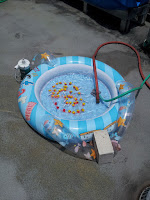Today finalized the week of omics and metagenomics and was concluded with a laid back session of "stupid questions", or "daft questions only" as Mick Follows put it last week. The point was to address questions, by students and faculty alike, that might be either embarrassingly simple or just "out-of-the-blue complex" to be put out there back in our home labs. To further the laid back atmosphere beer was served. Awesome!
 So to be honest, I think most of the questions were really good (just as last week) so either I'm daft or the session just helped people to ask questions they have been pondering a while after not having the time to ask them after each lecture (for some reason we are constantly behind schedule every day).
So to be honest, I think most of the questions were really good (just as last week) so either I'm daft or the session just helped people to ask questions they have been pondering a while after not having the time to ask them after each lecture (for some reason we are constantly behind schedule every day).
We also learned a meta-omics software today, called Galaxy. It is used to analyse and visualize different omic datasets using various tools. The protocol is called a "pipeline" which has different purposes and tools depending on the data. It was interesting but unfortunately not very rewarding since the sessions was very short (no time to actually go through what the different tool settings actually meant) and since it is web-based with a local server it was impossible to do any analyses when 20 people accessed it at the same time. We will have more time to do proper analyses with real data after the upcoming cruise but until then I guess I'll have to be satisfied with knowing how to navigating the software.
So lunch time introductions continue every day and I start to see some kind of pattern in people's stories. 1. No one really knew what they wanted to do growing up, some was even sure that science was not for them. 2. Microbial oceanography is a relatively small and intriguing field where many of the scientists started out in neurobiology thinking that to be a cool field, and ending in microbial oceanography since that truly IS a cool field. 3. There's a fundamental difference between how we use University studies in Sweden and the U.S. In Sweden you often study to find out what you want to do (it's free) and in the U.S. you work to find out what you want to do (studies are expensive). 4. With that said, a lot of scientists on the course have had some pretty dodgy jobs over the years while many of my friends in Sweden have never had a job outside of academia.
Oh, and finally; apparently I'm the first Swede to attend the course (in its 10 years history) and the first participant to represent Stockholm University.
 By the way (on the stupid questions session) I found this on the roof of our lecture hall. Anyone have a guess on what it actually is? :-)
By the way (on the stupid questions session) I found this on the roof of our lecture hall. Anyone have a guess on what it actually is? :-)

Inga kommentarer:
Skicka en kommentar